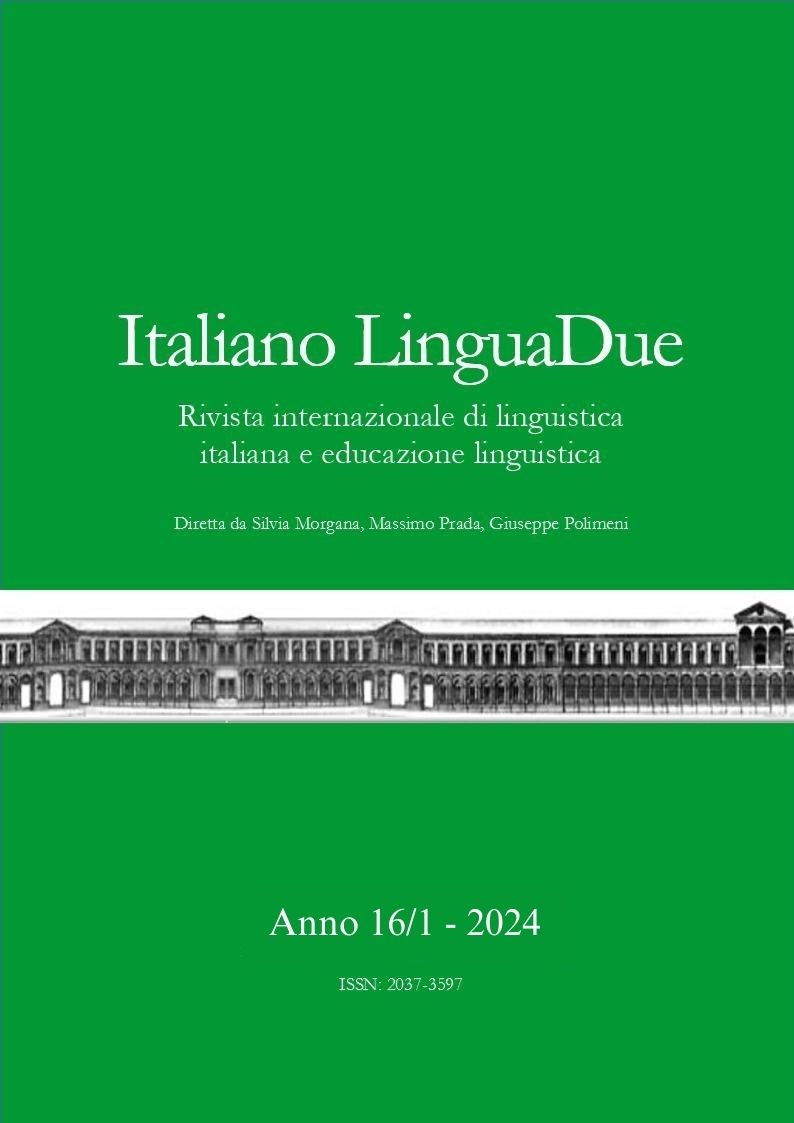DISTURBI SPECIFICI DI APPRENDIMENTO: IDEE PER UN’UNIVERSITÀ INCLUSIVA ALL’INTERNO DELLA COMUNITÀ EUROPEA
DOI:
https://doi.org/10.54103/2037-3597/23849Abstract
La promulgazione della legge 170/10 ha sancito un importante cambiamento per gli studenti con Disturbi Specifici di Apprendimento e ha aperto loro la strada per un percorso di inclusione anche in ambito universitario. L’esperienza italiana, si inserisce, tuttavia, in un contesto di notevole frammentazione legislativa e educativa che caratterizza la Comunità Europea. Le differenze fra paesi appartenenti alla comunità europea sia nel riconoscimento, sia nel trattamento dei Disturbi Specifici di Apprendimento rischiano di rappresentare un ostacolo alla piena inclusione degli studenti DSA, specialmente per quanto riguarda la mobilità per motivi di studio e formazione.
Specific learning Disabilities: ideas for an inclusive university within the European Community
The enactment of Law 170/10 has marked a major change for students with Specific Learning Disabilities, paving the way to their inclusion in higher education environments. However, the Italian experience unfolds in a context of legislative and educational fragmentation: differences between the EC countries in both the diagnostic path and treatment of SLD may represent an obstacle to the full inclusion of SLD students, especially concerning mobility for study and training purposes.
References
Ainscow M., Slee R., Best M. (2019), “Editorial: the Salamanca Statement: 25 years on”, in International Journal of Inclusive Education, 23, 7-8, pp. 671-676: https://doi.org/10.1080/13603116.2019.1622800.
Benedetti I., Barone M., Panetti, V. et al. (2022), “Clustering analysis of factors affecting academic career of university students with dyslexia in Italy”, in Sci Rep, 12, 9010: https://doi.org/10.1038/s41598-022-12985-w.
Bonifacci P., Canducci E., Gravagna G., Palladino P. (2017), “English as a foreign language in bilingual language‐minority children, children with dyslexia and monolingual typical readers”, in Dyslexia, 23, 2, pp. 181-206: https://doi.org/10.1002/dys.1553.
Cappelli D. (2021), “Dyslexia in L2 learning: comparison between languages and linguistic anxiety”, in Quaderni di Linguistica e Studi Orientali, 7, pp. 265-288: https://doi.org/10.13128/qulso-2421-7220-12011.
Commodari E., La Rosa V. L., Sagone E., Indiana M. L. (2022), “Interpersonal Adaptation, Self-Efficacy, and Metacognitive Skills in Italian Adolescents with Specific Learning Disorders: A Cross-Sectional Study”, in European Journal of Investigation in Health, Psychology and Education, 12, 8, pp. 1034-1049: https://doi.org/10.3390/ejihpe12080074.
Dwyer P. (2022), “The Neurodiversity Approach(es): What Are They and What Do They Mean for Researchers?”, in Human development, 66, 2, pp. 73-92: https://doi.org/10.1159/000523723.
Donato A., Muscolo M., Arias Romero M., Caprì T., Calarese T., Olmedo Moreno E. M. (2022), “Students with dyslexia between school and university: Post-diploma choices and the reasons that determine them. An Italian study”, in Dyslexia, 28, 1, pp. 110-127: https:/Maria/doi.org/10.1002/dys.1692.
Goldberg H. (2023), “Unraveling Neurodiversity: Insights from Neuroscientific Perspectives”, in Encyclopedia, 3, 3, pp. 972-980:
https://doi.org/10.3390/encyclopedia3030070.
Haft S. L., Chen T., Leblanc C., Tencza F., Hoeft F. (2019), “Impact of mentoring on socio-emotional and mental health outcomes of youth with learning disabilities and attention-deficit hyperactivity disorder”, in Child Adolesc Ment Health, 24, pp. 318- 328: https://doi.org/10.1111/camh.12331.
Ianes D., Demo H., Dell’Anna S. (2020), “Inclusive education in Italy: Historical steps, positive developments, and challenges”, in Prospects, 49, pp. 249-263: https://doi.org/10.1007/s11125-020-09509-7.
Ingesson S. G. (2007), “Growing Up with Dyslexia: Interviews with Teenagers and Young Adults”, in School Psychology International, 28, 5, pp. 574-591: https://doi.org/10.1177/0143034307085659.
Kefallinou A., Symeonidou S., Meijer C. J. W. (2020), “Understanding the value of inclusive education and its implementation: A review of the literature”, in Prospects, 49, pp. 135-152.
Knight C. (2021), “The impact of the dyslexia label on academic outlook and aspirations: An analysis using propensity score matching”, in British Journal of Educational Psychology, 91, pp. 1110-1126: https://doi.org/10.1111/bjep.12408.
Pellegrino G., Casali N., Meneghetti C., Tinti C., Re A. M., Sini B., Passolunghi M. C., Valenti A., Montesano L., Carretti B. (2023), “Universal and Specific Services for University Students with Specific Learning Disabilities: The Relation to Study Approach, Academic Achievement, and Satisfaction”, in Learning Disabilities Research & Practice, 38, pp. 274-284: https://doi.org/10.1111/ldrp.12323.
Piaget J. (1972), “L’épistémologie des relations interdisciplinaires”, in CERI-Centre pour la Recherche et l’Innovation dans l’Enseignement, L’interdisciplinarité: problèmes d’enseignement et de recherche dans les universités. Séminaire sur l’Interdisciplinarité dans l’Université organisé par le CERI avec la collaboration du Ministère Français de l’Education national à l’Université de Nice (France) du 7 au 12 septembre 1970, OCDE, Paris, pp. 131-144.
McGregor K. K., Langenfeld N., Van Horne S., Oleson J., Anson M., Jacobson W. (2016), “The University Experiences of Students with Learning Disabilities”, in Learning Disabilities Research & Practice, 31, pp. 90-102: https://doi.org/10.1111/ldrp.12102.
Nilholm C. (2020), “Research about inclusive education in 2020 – How can we improve our theories in order to change practice?”, in European Journal of Special Needs Education, 36, 3, pp. 358-370: https://doi.org/10.1080/08856257.2020.1754547.
Sumner E., Crane L., Hill E. L. (2021), “Examining academic confidence and study support needs for university students with dyslexia and/or developmental coordination disorder”, in Dyslexia, 27, pp. 94-109: https://doi.org/10.1002/dys.1670.
Wilmot A., Pizzey H., Leitão S., Hasking P., Boyes M. (2023), “Growing up with dyslexia: Child and parent perspectives on school struggles, self-esteem, and mental health”, in Dyslexia, 29, 1, pp. 40-54: https://doi.org/10.1002/dys.1729.
Zuppardo L., Serrano F., Pirrone C., Rodriguez-Fuentes A. (2023), “More Than Words: Anxiety, Self-Esteem, and Behavioral Problems in Children and Adolescents With Dyslexia”, in Learning Disability Quarterly, 46, 2, pp. 77-91: https://doi.org/10.1177/07319487211041103.
Downloads
Published
Issue
Section
License

This work is licensed under a Creative Commons Attribution-ShareAlike 4.0 International License.




